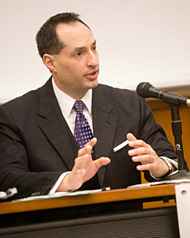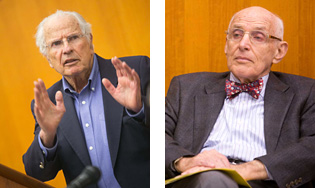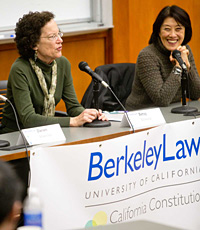By Nancy Bronstein

of the California Constitution
Center at Berkeley Law.
A Berkeley Law lecture hall was filled to capacity recently for a day-long symposium—Local Governments Navigating the California Constitution: Rough Waters and Shifting Sands—co-sponsored by the Municipal Law Institute of The League of California Cities and the law school’s newly minted California Constitution Center.
It was the center’s first public forum since opening its doors last summer under the leadership of Dr. David Carrillo ’95, the center’s director and founder.
For Carrillo, the symposium moderator, public forums are a clarion call to marshal a thriving community of legal scholars to stimulate and sustain a deep interest in the California state charter.
“This is an area that is largely missing as a dedicated specialty at California law schools,” Carrillo said. “Because no comprehensive body of legal work exists on the critical state constitutional issues facing our courts, practitioners are left with little guidance.”
Designed to stimulate scholarly dialogue about the state constitution’s impact on local government, the symposium tackled a selection of pressing issues confronting state, federal, and local officials.
Panelists discussed constitutional questions over issues involving privacy rights, free speech and religious liberty, water access, and state finance and revenue. Topics also included the evolving trend by state officials to limit cities’ powers and the tension between local versus state control.
The program attracted a mix of city attorneys, county counsels, and private practitioners, as well as academics and law students.

(retired) of
the California Supreme Court,
and Joseph L. Sax,
professor (emeritus)
of
Environmental
Regulation at
Berkeley Law.
The panels were comprised of experts from across the state, including two eminent jurists and scholars: Joseph L. Sax, professor (emeritus) of Environmental Regulation at Berkeley Law, and Hon. Joseph R. Grodin ’51, associate justice (retired) of the California Supreme Court. Sax, considered the father of environmental law, moderated the panel on water rights; Grodin, a recognized expert on the California constitution, joined the panel on privacy rights.
“Unquestionably, there is a resurgence of interest in the state constitution,” said Grodin, author of California Constitution: A Reference Guide. “At least two factors have contributed to that growth in interest: one is the decision of the California Supreme Court in same-sex marriage cases. The Court has long been in the forefront of state constitutional development when it comes to protection for individual rights. But the same-sex marriage decision, based squarely and entirely on the California Constitution, served to increase both public and professional attention to the primacy of state constitutions in the protection of civil rights and liberties.”
“Secondly, there’s the relationship between the state’s governmental structure and the state’s fiscal problems,” said Grodin, “or the manner in which budgets are created, how taxes are raised and distributed, and the relationship between state and local governments—all of which have been the subject of recent ballot measures.”

and Iris P. Yang, Partner,
Best Best & Krieger LLP.
If you believe Tip O’Neil’s conventional wisdom that all politics are local, said Carrillo, then becoming a student of the complex policies addressed in our state constitution is the best path towards a thorough understanding of our state government.
“Scholarly interest in state constitutions has waxed and waned over the existence of our country,” Carrillo said. “State constitutions once were the primary source of individual rights and liberties. That’s still true to some extent today, particularly in California. State laws, arguably, have a much greater day-to-day effect on our lives and the average citizen’s political power is greater at the state level. Because our state constitution is so easily amended and changes so frequently, it merits far more concentrated study than it has received so far.”
One of Carrillo’s key goals is to promote collaboration among academics, practitioners, and the judiciary towards a better understanding of the state’s organic law. More broadly, he says, “While I expect that the center at Berkeley Law will be the premier venue for studying the state constitution, I hope that other California law schools will create their own initiatives in this area. If the success of this symposium is any indication, there is an unmet need for this kind of study.”
Other symposium participants included Tara Mueller, deputy attorney general of California; Daniel Hentschke, general counsel of the San Diego County Water Authority; Danny Chou, Santa Clara assistant county counsel; and Buck Delventhal, deputy city attorney of San Francisco.
For more photos of the event, please see the photo gallery here.